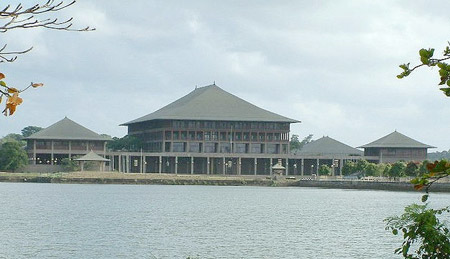|
Politics of 'Bonus Seats':
Can the JVP become the 'third force'?
by a Special Correspondent
Four major political forces are pitted against each other in the
coming parliamentary general election. One of them, the TNA, is
concentrating on the North and East and although its impact elsewhere
cannot be discounted, it may not be necessary to bring it into the
electoral equation in most other districts.
 |
|
Pix: staticflickr.com |
The major electoral contest, as everyone knows, is between the United
National Front for Good Governance (UNFGG), largely dominated by the UNP
and the United Peoples' Freedom Alliance (UPFA) dominated by the 'Bring
Back Mahinda' wing the of the SLFP. The third group, the Janatha
Vimukthi Peramuna, is struggling to be the third force in Sri Lankan
politics asserting its undeniable adherence to integrity in politics
while attempting to convince the electorate to forget its turbulent
history of a few decades ago.
Even the most enthusiastic supporter of the UPFA would find it
difficult to deny the dictatorial tendencies, family dominance and
widespread corruption of the last regime. Disgusted by these excesses,
sometimes even personally experienced, the large majority of Sri Lankans
voted to overthrow the regime and install Maithripala Sirisena as
President. Many of the supporters of President Sirisena would, however,
have found it difficult to totally identify themselves with the UNP
which threw its weight behind him, given their perception of the UNP's
historical role and, cultural and political values. The political space
has therefore been created for a third force to make a momentous
entrance into Sri Lankan politics and the JVP is now, correctly, seizing
this opportunity. Developments of the past few months have, however,
undermined the strategy of the JVP. In a straight fight between the UNP
and the SLFP, the JVP would have been an attractive proposition rallying
not only the protest votes against both big parties but also the votes
of those who would want to give this hitherto un-tested group a chance
to show what they can do.
However, machinations within the SLFP and UPFA during the past few
months have transformed the election from a political fight between the
two major parties into a struggle between those who want to bring back
Mahinda and those who want, at all costs, to prevent a return to Mahinda
rule. These developments are bound to adversely affect the JVP's
struggle to assert itself as the 'third force'.
Under our proportional representation (PR) vote system, the
parliamentary seats in each district are divided among the political
parties in proportion to the votes received but the party which receives
the highest number of votes gets an additional 'bonus seat'. Although
distorting the proportional vote system, bonus seats help by
contributing to the stability of the government formed. It is therefore
crucial for major political parties to try to win at least one more vote
than its rival in a district and obtain the bonus seat which could
impact national electoral success.
The effect this has in large districts like Colombo, Kandy and
Kurunegala may be less important. In a district of 15 seats where only
two parties come very close to each other in votes polled, the bonus
seat entitlement would give 8 seats to one party and 7 to the other as
the bonus seat is added to the 7 seats won by the party with the higher
vote.
If a third party gets one seat, the difference would be more
significant with the 14 seats initially divided 7, 6 and 1 and with the
bonus seat it becomes 8, 6 and 1, so that a difference of even one vote
could contribute to a two seat difference.
This is even more crucial in districts with fewer seats like
Hambantota, Moneragala and Trincomalee. In a district with 5 seats,
seats would be divided 3 and 2 but if a third party gets one seat, the
four seats would be divided 2, 1 and 1 and with the bonus seat 3, 1 and
1. Although the difference in seats is still 2, the party with the
higher vote would receive three times the number of seats of the party
coming aclose second. If a district has an even number of seats, say 6,
the difference in seats would be two with the bonus seat increasing the
seats of the leading party to 4 against 2 for the other party. If a
third party gets a seat, the difference in seats would be reduced to one
with the parties receiving 3, 2 and 1.
The winning of bonus seats is important as they significantly impact
on who will form the next government and this significance is
disproportionally amplified in districts with a smaller number of seats.
Where does this leave the JVP, a party which deserves to be well
represented in Parliament? With the heightening of the fervour in the
struggle between the pro-Mahinda and the anti-Mahinda groups and the
surge of such feeling among the general public, the JVP is bound to be
the loser.
The recognition of the importance of the extra vote to contribute to
winning a bonus seat is likely to eat into the vote the JVP would have
obtained in the absence of the 'Bring back Mahinda' campaign.
This would unfortunately be an undesirable consequence of the
bring-back Mahinda movement. |

